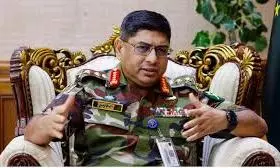
Bangladesh Army Chief warns of national crisis, calls for unity amid political turmoil
text_fieldsBangladesh's Army Chief, General Waker-Uz-Zaman, has raised serious concerns over the country's deteriorating law and order situation, warning that ongoing political conflicts and social unrest are putting national sovereignty at risk.
Speaking at a recent armed forces function, he emphasised the urgent need for national unity and institutional discipline to prevent further chaos.
General Zaman acknowledged that political turmoil has led to a deep sociopolitical crisis, fueling violence, instability, and widespread fear among citizens. "The anarchy we are witnessing today is of our own making," he stated, criticising the increasing divisions and infighting that have consumed Bangladeshi society, reported AFP.
He also pointed to serious inefficiencies in the police force, highlighting that many officers, from senior to junior ranks, are either jailed or facing judicial cases, leading to a lack of enforcement and further instability.
"As law and order continues to collapse, the burden of ensuring stability falls increasingly on the armed forces," he remarked.
Issuing a stark warning, the army chief stated that Bangladesh’s independence and integrity are at stake if political and social divisions persist.
"If you continue to fight among yourselves, injure, and kill one another, then the very foundation of this country will be in danger," he cautioned, urging citizens to move beyond their differences.
Without naming specific political factions, he criticised the current climate of blame and accusations, which, he said, has created opportunities for criminal groups and destabilising forces.
Bangladesh has witnessed a surge in violence, vandalism, and rioting in recent months, prompting security forces to launch 'Operation Devil Hunt' in February. Within just three weeks, authorities arrested over 8,600 individuals, accusing them of trying to destabilise the nation.
General Zaman also addressed concerns about human rights violations, including allegations of enforced disappearances, torture, and extrajudicial killings since the military assumed a greater role in governance. He insisted that such cases must be investigated and justice must be ensured to prevent the country from falling into a "cycle of violence."
Following the fall of the Sheikh Hasina government last August, Bangladesh has been governed by an interim administration led by Nobel laureate Muhammad Yunus, who was sworn in by the military. General Zaman reaffirmed his commitment to holding elections within the promised 18-month timeline, stating that the country remains on track to conduct general elections by late 2025 or early 2026.
"Professor Yunus is doing his best to unite the country. We must support him," he urged.
Meanwhile, Nahid Islam, a key figure in the student-led protests that led to Hasina's ouster, has resigned from his position as Telecom Minister in the interim cabinet. His resignation comes ahead of the expected launch of a new political party on February 28, adding another layer of uncertainty to Bangladesh's political landscape.












